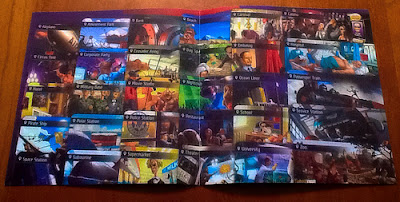Spies have a way of hiding and ferreting out information -- and it turns out, they make the foundation for a really fun party game. Spyfall from Cryptozoic Entertainment is a quick, easy, fun card game involving listening, bluffing, and planning.
Spyfall begins with 30 sets of location cards in plastic bags, with the game logo on top and the Spy card showing on the bottom. The first player takes out the cards, game logo on top, and takes out the Spy card and a number of cards (all the same location) equal to the number of players minus one. The cards are shuffled and dealt out, then every player looks at and then hides their card. A timer (not provided, but most iPods and cell phones have stopwatches) starts the eight-minute round, and the game begins!
The Non-Spy players want to figure out who the Spy is and successfully accuse them. The Spy wants to either figure out where they are, avoid being found out, or successfully accuse someone else of being the Spy. During the game, a player asks another player a question, and that player can answer in any manner they like. This means asking "Are you the Spy?" is pointless -- a player will simply deny it -- but asking things related to the location ("How many times a year do you go here?" "How dangerous is this place?" "What's the most interesting thing you've brought home from here?") can help to establish whether a player is or isn't a Spy (as well as possibly giving information to the Spy about where everyone is). The player who was asked a question then asks another player a question (not the one who just asked them something), and so on. (A slightly more advanced version has players taking on the role listed on the bottom of the locations,)
During the eight-minute round, each player can stop the timer and accuse a player of being the Spy. Everyone but the accused player gets to vote, and if the voters unanimously agree the accused player is the Spy, that player flips over their card. If the accused is the Spy, the non-Spy players win; if not, the Spy wins. If the vote isn't unanimous, the timer is restarted and the game continues. Also, if the Spy thinks they know the location, they can reveal themselves as the Spy and guess the location. If they guess correctly, they win; if not, they lose.
After the eight minutes are up, each player gets an opportunity to accuse someone of being the Spy, and everyone but the accused votes (just like during the round). If the Spy is found, the non-Spy players each get a point, with the one who accused the Spy getting two points. The Spy gets four points if they either guess the location during the eight minutes or someone else is successfully accused of being the Spy; the get two points if they aren't discovered at the end of the game.
Spyfall works very well. The rules are pretty simple, and the speed of the game means it's easy to get numerous rounds played in a very short round. Since everyone is trying to figure something out -- non-Spies trying to figure out who's the Spy, the Spy trying to figure out the location -- everyone has to listen to the questions and answers even when it's not their turn, keeping everyone involved throughout the game. Whoever is the Spy has to improvise and bluff while figuring out the location, while other players have to be careful and not jump the gun when accusing others.
It would be nice if there were reference cards with the locations for people to look at, but passing around the instruction book seemed to work well. Spyfall is a lot of fun, keeping all the players thinking, listening, asking and answering.
Overall grade: B+
Reviewed by James Lynch
Subscribe to:
Post Comments (Atom)






No comments:
Post a Comment